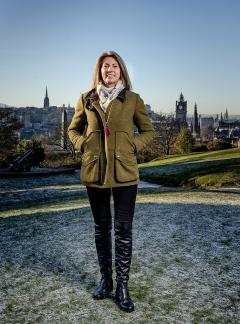Our pioneers: 60 years of excellence in nursing education
Enlightened thinking at the University since the 1950s has changed the way nursing is taught and regarded today
In 1956, in a small flat on George Square, the University opened its Nurse Teaching Unit. Traditionally a vocational subject, this was the first department of its kind to be found at a British university. The unit would become Nursing Studies and went on to transform the profession in the UK and beyond.
In 2016 the University celebrated the 60th anniversary of Nursing Studies, now Europe’s oldest nursing department. A series of events marked the diamond jubilee, from student ceilidhs to alumni reunions and, as a sign of the department’s impact upon the profession and its global reach, the Royal College of Nursing’s International Nursing Research Conference was held in Edinburgh to coincide with the anniversary.

In April 2016 the University’s Chancellor, Her Royal Highness The Princess Royal, met former nursing graduates and current staff and students to hear about how one big idea spread from Edinburgh around the world.
Nursing at Edinburgh was established by Elsie Stephenson, described by the Journal of Advanced Nursing as “British nursing’s messiah of the 20th century”. Her plan was to unlock nurses’ full professional potential.
“Elsie’s vision was to have nurses who thought for themselves, had critical skills, and who were creative in their approaches to health and nursing,” says Dr Sheila Rodgers, the current head of Nursing Studies.
“That was her passion,” Dr Rodgers continues. “She wanted nurses to study at university, giving them the opportunity to read different subjects that broaden their thinking. This was a totally different ethos to nurse training in the 1950s and 1960s, which tended to encourage a conformist, regulatory view of nursing.”
The Edinburgh tradition
Empowering nurses was not universally accepted at the time. Edinburgh graduate Elisabeth Nicholson started her studies in 1961, in one of the first cohorts on the integrated degree. She studied English Literature and French for three years then an additional two years to gain her diploma in Advanced Nursing Education. She recalls the frosty reception this new breed of university-educated nurses received on the wards.
“A lot of the health professionals made it known they didn’t approve of nurses being trained at university,” she says. “They saw us as a threat. The Royal Infirmary wouldn’t let us stay in their staff housing or give us uniforms. My mother had to buy me three white dresses to wear on the wards.”
Both the patients Ms Nicholson dealt with and the constraints placed upon her fellow nurses spoke of a profession untouched by time or progress. Student nurses were locked inside their accommodation at 10.30pm each night. If they got married, they had to leave the profession. In this context, teaching nursing at a university was revolutionary. By situating it within social sciences, as opposed to the School of Medicine, Edinburgh’s approach was doubly progressive.
“That is the Edinburgh tradition,” says Dr Rodgers. “Yes, we work across clinical sciences but we have a strong social science perspective. We focus on the patients’ experience of care. Otherwise you can be quite inward looking and ask ‘what are our priorities for nursing?’ rather than ‘what do patients and their families actually want and need?’ ”
Armed with this unique perspective, Ms Nicholson graduated and trained as a midwife. She went on to work in Paris and Geneva before settling in Shetland. Her fellow graduates similarly went out into the world, gained positions of influence, and spread Elsie Stephenson’s new ideas into the system.
Pioneers included Professor Anne Marie Rafferty, an alumna who is currently Dean of the Florence Nightingale School of Nursing and Midwifery at King’s College London. Professor Rafferty sat on the RN4cast Study, an influential work demonstrating the value of registered nurses and their impact on the quality of patient outcomes.
“Elsie’s vision was to have nurses who thought for themselves, had critical skills, and who were creative in their approaches to health and nursing.”
Professor Alison Tierney graduated in 1971. The Roper-Logan-Tierney model, which switched the focus of nursing onto supporting patients’ needs for daily life, reshaped how the health service in the UK, and in many places internationally, structured their approach to nursing.
A lasting global legacy
Graduates have become directors within the World Health Organization and heads of academic departments in Canada, America and Hong Kong. A significant sign of the success of the Edinburgh nursing experience, is that for the last six years, across the UK, all nurses have been educated to degree level.
Staying true to its original spirit, Nursing Studies at Edinburgh continues to innovate. The department has pioneered research in dementia, mental health and the health of older people. It is currently leading on important areas of public health that are frequently overlooked, such as alcohol abuse in prisons and gender-based violence against migrants.
The result is a continuing tradition of excellence. The influential Guardian University Guide has consistently ranked Edinburgh number one in the UK for nursing and midwifery. The 2014 Research Excellence Framework rated 83 per cent of Nursing Studies’ research at the University as world leading or internationally excellent.
Edinburgh’s reputation for nursing continues to draw students from across the world. Matthew Steffan is a first-year undergraduate from France. He was drawn to nursing at Edinburgh because of the small class sizes, the career options that nursing now offers, and the course’s reputation. In 2015, 98.5 per cent of students said they were happy with the quality of teaching.
“I feel very privileged to be on this course,” says Matthew. “Everyone on it feels proud. You can tell that the lecturers and teachers are proud of it too. It is something I’ll continue to feel more and more through the years. I’ve seen how nurses make a difference in people’s lives. I want to provide that for someone too.”
Photo © Tricia Malley Ross Gillespie www.broaddaylightltd.co.uk

